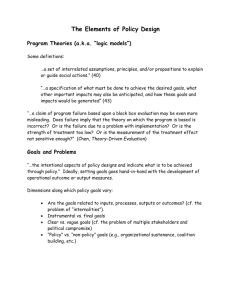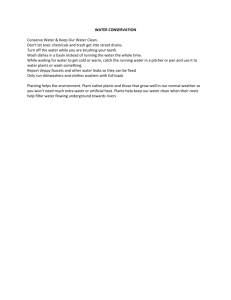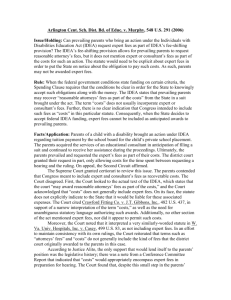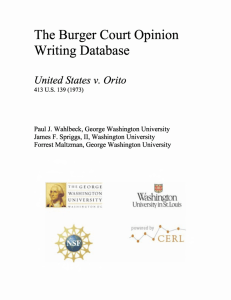The Deadman's Statute
advertisement
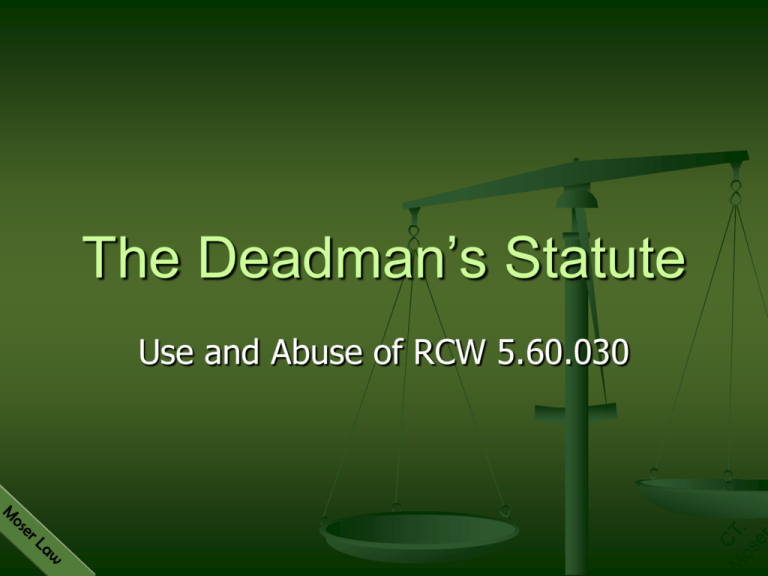
The Deadman’s Statute Use and Abuse of RCW 5.60.030 By Any Other Name . . . Dead Man Statute Dead Man’s Statute Deadman Statute Deadman’s Statute Transaction with person since deceased RCW 5.60.030 No person offered as a witness shall be excluded from giving evidence by reason of his or her interest in the event of the action, as a party thereto or otherwise, but such interest may be Summary shown to affect his or her credibility: Text PROVIDED, HOWEVER, That in an action or proceeding where the adverse • executor, 1 sentence party sues or defends as administrator or legal representative of any deceased person, deriving right or statement title by, through or from any Basic black letter •or as205 words deceased person, or asof thethe guardian limited guardian law,orallowing an of the estate or person of any incompetent or disabled person, or of any minor under the age • 18 commas interested party tothe testify. of fourteen years, then a party in interest or to record, shall not be • or 2herdependent admitted to testify in his own behalf to any transaction had by him But . .as. clauses or her with, or any statement to him or her, or in his or her presence, • 6 made “person” by any such deceased, incompetent or disabled person, or by any such minor under the age of•fourteen 4 “interest” years: PROVIDED FURTHER, That this exclusion shall not apply to parties of record who sue or defend in a • 4 “party” representative or fiduciary capacity, and have no other or further interest in the action. • 4 “no” or “not” • 3 “action” • 3 “shall” RCW 5.60.030 Deadman’s Statute Purpose of the Statute Elements of the Statute Transactions Parties in Interest Adverse Party Title or Interest Deceased + Statements Exceptions Work Around Strategies Waiver Doctrine Application Deadman’s Statute; Use and Abuse PURPOSE OF THE STATUTE Purpose Of The Statute Consider the purpose of the statute: If you represented the “protected party” consider why the statute applies, starting with the purpose of the statute If you represent the “party in interest” offering the testimony of a deceased consider why the purpose of the statute should not make the testimony inadmissible. Purpose Of The Statute “Death having closed the lips of one party, the law closes the lips of the other.” In re Cunningham's Estate, 94 Wash. 191, 161 P. 1193 (1917). Purpose Of The Statute “The purpose of the statute is to ‘prevent interested parties from giving self-serving testimony about conversations or transactions with the decedent.’ Wildman v. Taylor, 46 Wash.App. 546, 549, 731 P.2d 541 (1987).” Erickson v. Robert F. Kerr, M.D., P.S., Inc., 125 Wash. 2d 183, 187, 883 P.2d 313, 316 (1994) Then she told me . . . Purpose Of The Statute “One of the major purposes . . . is to give protection to the writings and documents of a decedent or persons claiming thereunder, so that decedent's purposes in making a conveyance in writing will not be defeated by parol description of his acts and purposes after his death.” Hampton v. Gilleland, 61 Wash. 2d 537, 543, 379 P.2d 194, 197 (1963) Purpose Of The Statute Notice that pursuit of truth is not mentioned in cases that apply the statute. It is not a truth seeking devise, it is a fairness device. Ultimately the purpose is to promote fairness, even at the possible loss of credible evidence, anticipating justice will be served.* * C. T. Moser, no citation to authority Deadman’s Statute; Use and Abuse ELEMENTS OF THE STATUTE RCW 5.60.030 states in part: “(I)n an action ... where the adverse party sues or defends ... as deriving right or title by, through or from any deceased person ... then a party in interest or to the record, shall not be admitted to testify in his or her own behalf as to any transaction had by him or her with, or any statement made to him or her, or in his or her presence, by any such deceased ...” O'Steen v. Wineberg's Estate, 30 Wash. App. 923, 935, 640 P.2d 28, 35 (1982) Party In Interest A witness is considered a party in interest: 1) if the witness stands to either gain or lose as a direct result of the judgment; or 2) if the record may be used as evidence against the witness in some other action. 5A Wash. Practice., Evidence Law and Practice § 601.17 (5th ed.) Party In Interest The witness will be considered interested only if the witness's interest is present, certain, and vested. An interest that is uncertain, remote, or contingent is insufficient to bar the witness's testimony. 5A Wash. Practice., Evidence Law and Practice § 601.17 (5th ed.) Party In Interest A witness is prohibited from testifying only if he or she is an interested party at the time of trial. An interest existing at some other time does not disqualify the witness. 5A Wash. Practice., Evidence Law and Practice § 601.17 (5th ed.) Adverse Party Bars the testimony of a party in interest only when the adverse party sues or defends as a representative or successor of a deceased. Does not bar the testimony of a party in interest unless there is also an adverse party as the term is used in the statute. 5A Wash. Prac., Evidence Law and Practice § 601.18 (5th ed.) Right Or Title Persons deriving right or title through a decedent. Statute bars testimony by a party in interest when the adverse party sues or defends “as deriving right or title by, through or from any deceased person.” 5A Wash. Prac., Evidence Law and Practice § 601.18 (5th ed.) Right Or Title Applied to community property, where a spouse dies before trial and the “party in interest” offers testimony about a transaction with the spouses. Diel v. Beekman, 7 Wash. App. 139, 154, 499 P.2d 37, 47 (1972) overruled on other grounds by Chaplin v. Sanders, 100 Wash. 2d 853, 676 P.2d 431 (1984) Right Or Title “The protection is unqualified and one who derives a right from a deceased, be it partial, total, separate or community, will not have testimony by a party-in-interest forced into the record over his objection.” Diel v. Beekman, 7 Wash. App. 139, 154, 499 P.2d 37, 47 (1972) overruled on other grounds by Chaplin v. Sanders, 100 Wash. 2d 853, 676 P.2d 431 (1984) Transaction The doing or performing of some business between parties, or the management of any affair. The test of a “transaction” is whether the deceased, if living, could contradict the witness of his own knowledge. Estate of Lennon v. Lennon, 108 Wash.App. 167, 174-175, 29 P.3d 1258, 1263 (2001) Transaction Does not prevent an interested party from testifying regarding his or her own feelings or impressions. Estate of Lennon v. Lennon, 108 Wash.App. 167, 174-175, 29 P.3d 1258, 1263 (2001) Deceased Person + The Deadman’s Statute also applies to: Incompetent persons Disabled persons Persons under 14 years of age Statement The dead man statute bars testimony about any “statement made”: By the decedent to the witness; Or in the witness's presence. 5A Wash. Prac., Evidence Law and Practice § 601.19 (5th ed.) Deadman’s Statute; Use and Abuse EXCEPTIONS TO THE STATUTE Documentary Evidence RCW 5.60.030 does not bar documentary evidence, although it may limit testimony about the documents. Wildman v. Taylor, 46 Wash.App. 546, 731 P.2d 541 (1987). Thor v. McDearmid, 63 Wash. App. 193, 202, 817 P.2d 1380, 1387 (1991) Documentary Evidence Notice that the first clause of the statute uses the term “evidence” in reference to an interested party; The statute then uses “testify” in the second clause to modify the first. The purpose is to protect a deceased’s written documents from contrary parol testimony of the living. Entities & Deceased Agent “Our statute, it will be observed, applies, in its terms, only in the case of the death of a natural person who is a principal in the contract. It makes no reference to corporations, or to agents of corporations, or even to agents of deceased natural persons, and to read into it this further exception would be, we believe, an unwarranted extension of its terms.” Northern Bank & Trust Co. v. Harmon, 126 Wash. 25, 217 P. 8 (1923) Criminal Cases Statute doe not apply to criminal cases 5A Wash. Prac., Evidence Law and Practice § 601.14 (5th ed.) Discovery Statute does not apply to discovery. The statute does not prohibit depositions, interrogatories, or other discovery about the transaction in question. 5A Wash. Prac., Evidence Law and Practice § 601.15 (5th ed.) Multiple Defendants If the interested party sues multiple defendants, testimony that may be barred as against one defendant (who is an adverse party under the statute) may still be admissible for the limited purpose of supporting a claim against another defendant (who is not an adverse party). 5A Wash. Prac., Evidence Law and Practice § 601.18 (5th ed.) Deadman’s Statute; Use and Abuse WAIVER DOCTRINE Waiver Statute may be waived when the protected party introduces evidence concerning a transaction with the deceased. Once the protected party has opened the door, the interested party is entitled to rebuttal. Estate of Lennon v. Lennon, 108 Wash.App. 167, 174175, 29 P.3d 1258, 1263 (2001) Waiver A waiver by introduction of testimony about one transaction does not extend to unrelated transactions and conversations. Engaging in pretrial discovery, including taking depositions or propounding interrogatories, is not waiver. Estate of Lennon v. Lennon 1,08 Wash.App. 167, 174-175, 29 P.3d 1258, 1263 (2001) Waiver Unless, a the protected party introduces the deposition or interrogatories into evidence. Estate of Lennon v. Lennon, 108 Wash.App. 167, 174-175, 29 P.3d 1258, 1263 (2001) Summary: Waiver Doctrine Testimony offered about the transaction Failing to object at trial Cross-examination beyond scope of direct Testimony of nonparty witness Deadman’s Statute: Use and Abuse WORK AROUND STRATEGIES 4 Ways Around The Statute Presenting documentary evidence rather than testimony; Presenting testimony by nonparty witnesses who have no financial stake in the outcome; Having the party in interest testify only about his or her feelings and impressions relative to the transaction; Waiver by the protected party. 5A Wash. Prac., Evidence Law and Practice § 601.16 (5th ed.) Deadman’s Statute; Use and Abuse APPLICATION BY CASE LAW Injured Hospice Nurse Case Botka v. Estate of Hoerr, 105 Wash.App. 974 (2001). Application: Deadman’s Statute in personal injury litigation Waiver Doctrine Summary judgment motion proceeding “What was the defense attorney thinking” doctrine Hospice Nurse Facts in Botka v. Estate of Hoerr: Hospice nurse Botka hired to care for Mr. Hoerr at his 3-story home; She uses knock and announce procedure to enter the home and is shown how to enter on the 2nd level and walk up to 3rd level bedroom; Hospice Nurse Facts in Botka v. Estate of Hoerr: She comes to the home on a day that Mr. Hoerr’s daughter is with the father, and they do not hear nurse enter house; Hospice nurse goes in the 2nd floor door and cannot find the stairway because it is dark and mistakenly enters a dimly lit laundry room and finds two more doors; Hospice Nurse Facts in Botka v. Estate of Hoerr: She comes to a door, opens it and feels along the wall for a light switch; She cannot find switch and steps into what she thinks is the stairway landing, but falls down empty elevator shaft and is injured. Hospice Nurse First clue that there is a problem Nurse sues, but only after Mr. Hoerr dies; Estate brings motion for summary judgment, saying that nurse was a trespasser and no duty of care was owed. Nurse responds saying she was an invitee, called ahead & told Mr. Hoerr that she was coming and she routinely entered the house without someone coming to the door. Hospice Nurse Estate responded by moving to strike nurse’s declaration as violation of Deadman’s Statute; Hospice Nurse Estate also responded with declaration of the daughter, Walsworth, saying: Nurse did not call ahead of time She was not given permission to come to the house She should have used the exterior stairs She entered the house without authority Waiver Doctrine Applied “We hold that Walsworth's declaration waived the deadman's statute. By stating that Botka “had to walk up the exterior stairwell to the third floor,” “had no authority to enter unannounced into any part of the home,” that “there was no reason for her to be in the laundry room,” and “she should have announced her arrival at the third floor,” Walsworth necessarily implied that Hoerr did not give Botka authority to act as she did.” Waiver Doctrine Applied Thus, the nurse’s testimony that she called ahead and was given permission to enter the house became admissible. Trial court reversed. The Lost Note Case O'Steen v. Wineberg's Estate, 30 Wash. App. 923, 640 P.2d 28 (1982). Application: Deadman’s Statute to direct testimony To cross-examination To documents Waiver doctrine “Party in interest or to the record” test The Lost Note Case Plaintiffs O’Steen sued the Wineberg estate claiming 10% interest in stock of an oil company; O'Steen claimed Wineberg agreed orally that money owed O’Steen would be put into the oil company stock deal to obtain a 10% interest, which Wineberg would hold in his own name but as trustee for O’Steen; The Lost Note Case O’Steen claimed Wineberg, now deceased, signed a note stating: “John O'Steen owns ten percent of LALTA Corporation, also ten percent of the farmout. Signed Wm. J. Wineberg.” “Farm out” is a term used for leasing mineral rights The Lost Note Case “Mrs. O'Steen testified on direct examination to having seen the note, to recognizing Wineberg's signature on it, and to losing the note in 1964.” The Lost Note Case Under cross-examination, Mrs. O'Steen testified she was familiar with William Wineberg's handwriting and signature and recognized the handwriting and signature on the note as Wineberg's. The Lost Note Case Mrs. O'Steen lost the note in 1964 when she and Johnny had marital difficulties and she took all of their valuable papers. The Lost Note Case Two witnesses testified that Johnny O'Steen showed them a note signed by William Wineberg stating that O'Steen had a 10 percent interest in the oil company. One witness testified that Wineberg told him that “Johnny O’Steen is in for ten percent.” Side Notes On The Lost Note Mineral right were on 8,000 acres of railroad property in Calgary, Alberta, Canada The American promoters formed a Canadian oil company they each paid 1¢ per share. The promoters found Wineberg & O’Steen at the Bahia Hotel in Ensenada, Mexico. One witness heard conversation at a card game between Wineberg & O’Steen Another witness to conversations was a casino manager in a Las Vegas bar. The Lost Note Case The Court of Appeals held: Mrs. O'Steen is a party to the record in the present case. The test of “transactions with a deceased” is whether the dead man, if living, could contradict the witness. Testimony of the loss of a writing is not evidence of a transaction with the deceased. The Lost Note Case The Court of Appeals held: The identification of a signature upon a writing is not a transaction with the deceased. Mrs. O'Steen was therefore competent to testify as to these matters, and her testimony on direct examination was limited to these matters. It was not until cross-examination that she was asked to testify as to the contents of the note. The Lost Note Case The Court of Appeals held: Cross-examination of a witness on a matter protected by the deadman's statute constitutes a waiver of that protection. The deadman's statute bars only the testimony of parties to the record or parties in interest. Neither witness was a party to the record. The test for a party in interest is whether he will gain or lose from the judgment The Lost Note Case Notice who did not testify: Johnny O’Steen Medical Records Case Erickson v. Robert F. Kerr, M.D., P.S., Inc., 125 Wash. 2d 183 (1994). Application: To medical records and business records exception Waiver doctrine Multiple parties doctrine Discussion of unfair application of statute by disqualifying the defendant doctor from testifying in his/her own defense in malpractice case. Medical Records Facts in Erickson v. Kerr: Defendant doctor treated the decedent for a number of years for depression and other ailments, until she committed suicide. A year later the doctor asked decedent’s husband how wife was doing, forgetting she was dead. (ruled admissible) Husband, as PR and on behalf of himself and his son, sued for medial malpractice. Medical Records Doctor’s medical records were the primary evidence of negligence. Plaintiff moved in limine, pursuant to the deadman’s statute, to exclude the doctor’s testimony of conversations with the decedent. Trial court ruled plaintiffs waived the statute by introducing medical records. Medical Records Jury found doctor was not negligent: Defense verdict. Court of Appeals reversed on waiver doctrine. Both parties appealed. Supreme Court reversed in part and affirmed in part. Medical Records We hold the introduction of Dr. Kerr's medical records did not waive the protection of the deadman statute as to the estate. The deadman statute is inapplicable to the action brought by the Ericksons in their individual capacities. See Maciejczak v. Bartell, 187 Wash. 113, 60 P.2d 31 (1936) (deadman statute only applies to actions brought on behalf of estate). Erickson v. Robert F. Kerr, M.D., P.S., Inc., 125 Wash. 2d 183, 189-90, 883 P.2d 313, 317 (1994) Medical Records: 2 Plaintiffs Estate sued for medical malpractice (a survival action) This was the decedent, through the PR, suing the doctor for negligence Therefore the records were introduced “on her own behalf” as a party to the record. Family members sued for wrongful death This was the surviving family suing the doctor for their loss, caused by the doctor’s malpractice Plaintiffs they were not a party to the transaction between decedent and doctor. Evidence of Habit Case Lasher v. Univ. of Washington, 91 Wash. App. 165, 957 P.2d 229 (1998). Application: To incompetent person To testimony of “habit” To medical records Evidence of Habit Case Facts in Lasher v. Univ. of Washington Plaintiff diagnosed with rare heart disease at 21 years old, while living in Colorado. Plaintiff moved to WA year later and treated at Harbor View Medical by cardiologist, who was professor at UW medical school. Cardiologist reduced plaintiff’s heart medication to one-third of what he had been taking. Evidence of Habit Case Facts in Lasher v. Univ. of Washington, 4 years later plaintiff collapsed from cardiac arrest while playing half-court basketball. Plaintiff survived, but had severe brain damaged and left incompetent. Plaintiff sued doctor for malpractice for failure to warn of risk of exercise or the benefits of a cardiac defibrillator device. Evidence of Habit Defendant doctor barred from testifying about conversations with incompetent patient under deadman’s statute. Trial court allowed doctor to testify of his “habit” to advise patients with certain heart conditions about the risk of physical activities. Jury returned a defense verdict, plaintiff appealed. Evidence of Habit Court of Appeals reversed: The purpose of the testimony about “habit” was to accomplish by indirect testimony what Dr. Greene could not testify to directly because of the bar in the deadman's statute. Lasher v. Univ. of Washington, 91 Wash. App. 165, 169, 957 P.2d 229, 231 (1998) Evidence of Habit The problem is that, notwithstanding Dr. Greene's testimony that he does sometimes note warnings he gives patients about the risk of strenuous exercise in their charts, he made no note in Jeff Lasher's chart that he had given him such a warning. Lasher v. Univ. of Washington, 91 Wash. App. 165, 170, 957 P.2d 229, 232 (1998) www.tomoser.com This PowerPoint may be viewed or downloaded on my website

